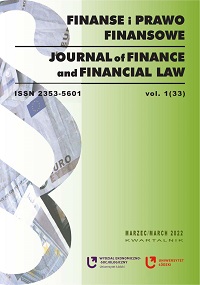The Principles of fair trade in theory and practice
DOI:
https://doi.org/10.18778/2391-6478.1.33.09Keywords:
general clauses, the principles of social coexistence, the principle of good manners, the principles of fair tradeAbstract
The purpose of the article: General clauses are an important element of the legal system. They supplement the law regulations taking into account moral norms commonly accepted in society. Their general nature means that they are the subject of both discussions in the legal literature and comments and references in court decisions. The specificity of general clauses and the need to precise them in each case in which they are applied, result in a certain unpredictability of judgments. One of the most famous general clauses is the clause of principles of social coexistence. It appeared in the Polish legal system after World War II along with the new political system. It replaced the principle of good manners used in the Second Polish Republic. Since 1990, the return of the name of this principle to the Polish legal system has been visible. On the other hand, in legal regulations relating to the capital market, the clause of the principles of fair trade is used. It can be considered that the nature of the three clauses mentioned above is similar. The aim of the article is to analyze the nature and similarity of these general clauses with particular emphasis on the clause of the principles of fair trade in the capital market.
Methodology: The study is theoretical and empirical in nature. The theoretical part was based on a review of the literature. The empirical part is realized by the analysis of the court decisions. Results of the research: The results show that the finding by the Polish Financial Supervision Authority a violation of the principles of fair trade as a basis for imposing administrative sanctions should be supported by a reference to the specific standard of conduct and be precisely described. It cannot be defined in general terms only. Otherwise, it may be effectively challenged by way of a complaint to an administrative court. On the other hand, in court judgments, in cases referring to the principles of social coexistence (the principles of fair trade), discrepancies in application can be noticed resulting from the specificity of general clauses.
Downloads
References
Biskup, R. (2007). Dobre obyczaje w działalności gospodarczej. Annales. Etyka w życiu gospodarczym, 10(1).
Google Scholar
Fabian, E., Rzecz o uczciwości kupieckiej. Albo o dobrych obyczajach wprowadzonych do orzeczeń sądów https://wszystkoconajwazniejsze.pl/ewa-fabian-rzecz-o-uczciwosci-kupieckiej/
Google Scholar
Fermus-Bobowiec, A. i Szewczak-Daniel, M. (2016). Zasady słuszności w kodeksie zobowiązań. Annales Universitatis Maria Curie-Skłodowska. Sectio G, 63(2).
Google Scholar
DOI: https://doi.org/10.17951/g.2016.63.2.43
Kopaczyńska-Pieczniak, K. (2016). Zasada uczciwości kupieckiej jako zasada prawa handlowego. Studia Iuridica Lublinensia, XXV(1).
Google Scholar
Leszczyński, L. (2016). Generalne klauzule odsyłające – ujęcie teoretycznoprawne. Annales Universitatis Maria Curie-Skłodowska. Sectio G, 63(2).
Google Scholar
DOI: https://doi.org/10.17951/g.2016.63.2.11
Mojak, J. (2016). Dobre obyczaje w polskim prawie kontraktowym – wybrane zagadnienia. Annales Universitatis Maria Curie-Skłodowska. Sectio G, 63(2).
Google Scholar
DOI: https://doi.org/10.17951/g.2016.63.2.57
Nowacki, J. (2003). Studia z teorii prawa. Kraków: Wydawnictwo Zakamycze.
Google Scholar
Pajor, T. (2009). Kilka uwag o roli ocen etycznych w prawie cywilnym. Annales. Etyka w życiu gospodarczym, 12(2).
Google Scholar
Radwański, Z. ed. (2002). System prawa prywatnego, t. 2, Warszawa: C.H. Beck.
Google Scholar
Safjan, M. (1990). Klauzule generalne w prawie cywilnym. Państwo i Prawo, 11.
Google Scholar
Safjan, M. (2008) W: K. Pietrzykowski, Komentarz, t. I, Warszawa: C.H. Beck.
Google Scholar
Żurawik, A. (2009). Klauzula generalna „dobrych obyczajów” – ujęcie teoretyczne. Ruch prawniczy ekonomiczny i socjologiczny, LXXI(1).
Google Scholar
Downloads
Published
How to Cite
Issue
Section
License

This work is licensed under a Creative Commons Attribution-NonCommercial-NoDerivatives 4.0 International License.














